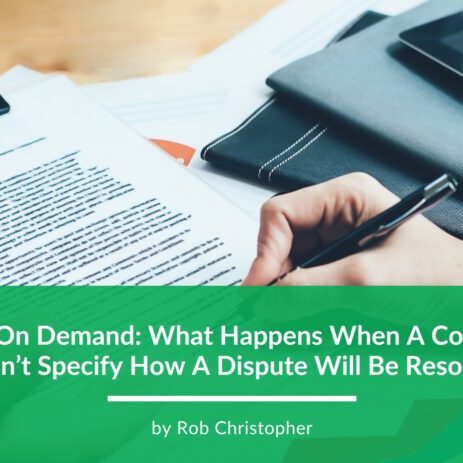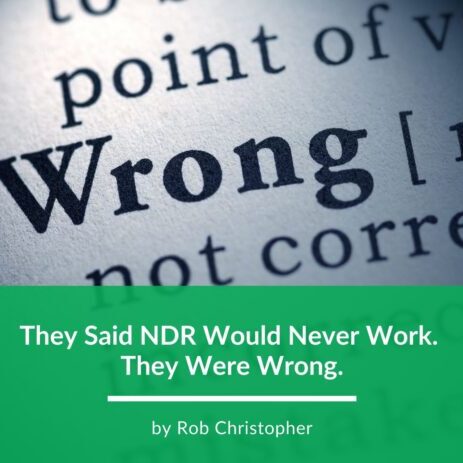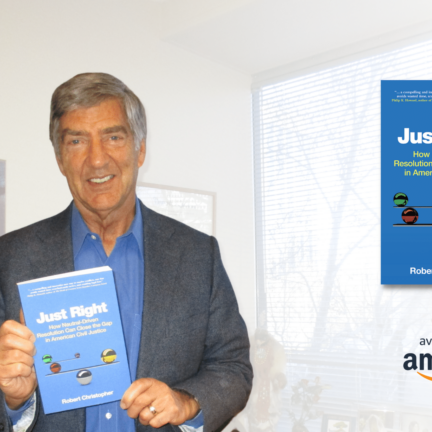Not All Disputes are Equal

Not all business and legal disputes are alike, and not all of them can be resolved in the same way. In writing my book Just Right: How Neutral-Driven Resolution Can Close the Gap in American Civil Justice, it was important to distinguish the types of common disputes for which NDR is most suitable.
As readers of my blog (and my book) know, NDR – Neutral-Driven Resolution – has become my passion. I developed it to help solve a large and growing problem in resolving common business and other legal disputes: They simply cost way too much. In most limited stakes cases, both parties end up spending more in legal fees than they stand to gain by winning their case.
NDR is a simple, less costly non-adversarial approach to resolving disputes using expert neutral arbiters agreed upon by both sides. It differs from standard alternative dispute resolution or mediation methods by avoiding the high cost of hiring lawyers who inevitably spend significant billable hours in discovery, depositions, court hearings, and testimony. It also avoids the lost sleep and aggravation that nearly always accompany lengthy, time-consuming legal disputes.
That’s not to say that NDR is right for every dispute. It is best used for limited stakes disputes, when the amount in contention is somewhere between $10,000 and $500,000. For amounts under $10,000, there is always small-claims court, which doesn’t involve lawyers but will require filing fees and include administrative costs (and may not always result in a satisfactory settlement). On the other end are “high stakes” disputes, cases involving from $500,000 into the millions of dollars. It makes sense in these cases to hire competent attorneys and spend whatever it takes to win.
But the vast majority of cases that arise in business and in life are limited stakes disputes. Unless they can be settled right away, it doesn’t make sense to bring in dueling lawyers to grind out a settlement that usually pleases no one and fails to deliver real or economically rational justice. Legal fees alone will often swamp the amount in dispute, to say nothing of the aggravation, lost productivity, and lost sleep these cases entail. Because of this, many businesses just walk away and take the loss rather than take precious time away from their job in what will likely be a fruitless pursuit of justice.
That’s where NDR comes in.
I developed NDR to do exactly what the title of my book says—fill this gap in American civil justice. It’s a way to settle limited stakes disputes quickly, easily, and without all the legal maneuvering and hassles that characterize most common disputes. Best of all, NDR delivers judicial-quality outcomes at a cost that consumes only a reasonable fraction of the value at stake—both in time and money.
I’ll be honest. NDR is outside the box of the traditional lawyer-driven process, and lawyers are understandably skeptical. But they should welcome NDR. It relieves them of dealing with these limited stakes disputes (which they often refer to as “dog cases”) so they can spend more time on larger, more lucrative cases. They should think of NDR as another tool in their arsenal that can help resolve disputes quickly and easily, and generate good will with their clients. (For more on this, see Why Lawyers Should Like Neutral Driven Dispute Resolution)
The details of NDR are in my book. Basically, it involves three steps. First, the parties agree in writing to use NDR (ideally, this will be done proactively at the time a contract is signed), and jointly select neutral experts and peers who will hear the facts of the case. Second, these neutrals investigate the case to learn the facts. Third, they issue a decision, which both parties have agreed will be binding.
The basic NDR process delivers huge out-of-pocket savings to both sides, reducing legal fees and related costs between three and six times compared with litigation, and assuring that total costs are a reasonable fraction of what is at stake. In other words, it enables real justice for all the parties involved.
My new book that explains all of this in detail is now available on Amazon and other online booksellers.
More to read
NDR on Demand: What Happens When a Contract Doesn’t Specify How a Dispute Will Be Resolved?
The best way to deter threats of litigation and minimize the costs, duration, and distractions of resolving any dispute is to put a dispute resolution clause specifying NDR — Neutral-Driven Resolution — in all your contracts BEFORE there is a problem. That means that if a dispute should arise between a business and a contractor,…
They Said NDR Would Never Work. They Were Wrong.
Many people are surprised by how effective NDR can be. Since publishing my book and speaking at events about NDR (Neutral-Driven Resolution), I’ve often been asked a simple question: Does it work? And if it really does lower the costs and the time it takes to settle common disputes, why doesn’t everybody know about…
“Morgan Hill author releases new book”
The Morgan Hill Times featured Rob’s new book in an article ahead of his “Meet the Author” night at Booksmart. “Legal disputes and conflicts cost businesses billions of dollars a year in lawyers’ fees, lost productivity, time and aggravation. A new book by Morgan Hill author Robert Christopher proposes an innovative, faster and simpler way…
Press Release
New Alternative Dispute Resolution Book Describes Innovative Method to Lower Costs, Aggravation of Business and Legal Disputes A Neutral-Driven Resolution Process Saves Substantial Time, Money, Stress SAN JOSE, Calif., March 24, 2022 — Legal disputes and conflicts cost businesses billions of dollars a year in lawyers’ fees, lost productivity, time, and aggravation. A new book…


